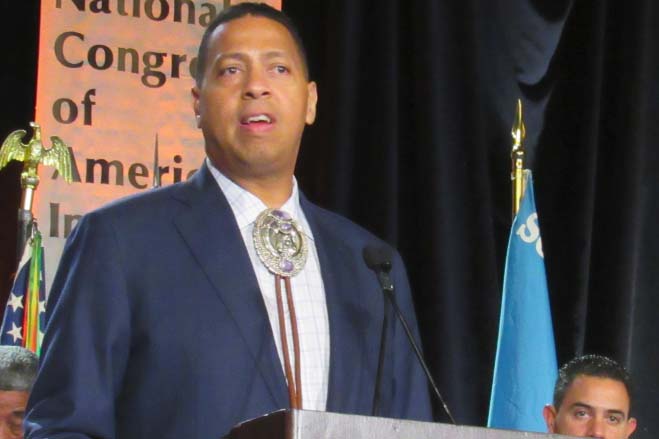
- Details
- By Darren Thompson
Cedric Cromwell, the Mashpee Wampanoag former tribal chairman, filed a motion to dismiss multiple charges in U.S. District Court on Jan. 19, 2021. He was indicted in federal court on Nov. 13, 2020 and charged in connection with the bribery scheme involving plans to build a resort and casino in Taunton, Mass.
Cromwell is seeking to dismiss some of the bribery and extortion charges against him. He faces 10 charges in federal court.
Cromwell served as chairman of the Mashpee Wampanoag from 2009 until his arrest on Nov. 13, 2020. He was indicted for two counts of accepting or paying bribes as an agent (or to an agent) of an Indian tribal government, one count of conspiring to commit bribery, for concert extortion under color of official right, and one count of conspiring to commit extortion.
“The charges allege that Mr. Cromwell violated the trust he owed to the Mashpee Wampanoag Tribe by committing extortion, accepting bribes and otherwise abusing his position,” said United States Attorney Andrew E. Lelling in a press release on Nov. 13, 2020.
The indictment alleges that the Mashpee Wampanoag Tribe’s Gaming Authority — led by Cromwell — contracted with an architecture-and-design company in connection with the tribe's plans to build a resort and casino in Taunton, according to the U.S. Department of Justice. The U.S. DOJ Alleges that Cromwell received payments valued at nearly $60,000 from an architecture-and-design company in exchange for nearly $5 million in contracts from the tribe from 2104-2017.
Cromwell denies the charges.
“This legal action is definitely a Trump set up,” Cromwell told Native News Online in an interview.
The Cape Cod-based tribe has faced years of legal setbacks for its planned First Light casino. The tribe gained federal recognition in 2007 and had more than 300 acres placed into federal trust and declared its reservation in 2016 under the Obama administration.
During the Trump administration many Obama-era land designations were challenged, resulting in legal and political setbacks on the $1 billion casino.
Former President Trump previously tried to use his authority against a bi-partisan house bill in 2019 that would affirm Mashpee Wampanoag’s right to 321 acres of land in Massachusetts. The Mashpee Wampanoag Tribe Reservation Reaffirmation Act, or H.R. 312, was introduced by Rep. William Keating (D-Mass) and co-sponsored by both Republicans and Democrats. Trump tweeted his opposition on May 8, 2019, calling the bill a “special interest casino bill” and urged Republicans to back out, which led the House to temporarily delete the vote.
The Mashpee Wampanoag Tribe traces its history back to the time when “Pilgrims” arrived on the eastern shores of Cape Cod in 1620. They are the famed tribe that is depicted in today’s classrooms in the teachings of the “First Thanksgiving” in 1621.
The charge of paying a bribe to an agent of an Indian tribal government, or being an agent of an Indian tribal government who accepts a bribe, provides for a sentence of up to 10 years in prison, three years of supervised release and a fine of $250,000. The charge of conspiring to commit bribery provides for a sentence of up to five years in prison, three years of supervised release and a fine of $250,000. The charges of extortion under color of official right and conspiring to commit extortion each provide for a sentence of up to 20 years in prison, three years of supervised release and a fine of $250,000. Sentences are imposed by a federal district court judge based upon the U.S. Sentencing Guidelines and other statutory factors.
More Stories Like This
Native News Weekly (August 25, 2024): D.C. BriefsDeb Haaland Earns Endorsement From Communications Workers of America Local 7076
University Soccer Standout Leads by Example
Two Native Americans Named to Democratic Congressional Campaign Committee's“Red to Blue” Program
Cheyenne River Youth Project Hosts Young Women’s Winter Camp as Part of Lakota Culture Internship
Help us defend tribal sovereignty.
At Native News Online, our mission is rooted in telling the stories that strengthen sovereignty and uplift Indigenous voices — not just at year’s end, but every single day.
Because of your generosity last year, we were able to keep our reporters on the ground in tribal communities, at national gatherings and in the halls of Congress — covering the issues that matter most to Indian Country: sovereignty, culture, education, health and economic opportunity.
That support sustained us through a tough year in 2025. Now, as we look to the year ahead, we need your help right now to ensure warrior journalism remains strong — reporting that defends tribal sovereignty, amplifies Native truth, and holds power accountable.
 The stakes couldn't be higher. Your support keeps Native voices heard, Native stories told and Native sovereignty defended.
The stakes couldn't be higher. Your support keeps Native voices heard, Native stories told and Native sovereignty defended.
Stand with Warrior Journalism today.
Levi Rickert (Potawatomi), Editor & Publisher
